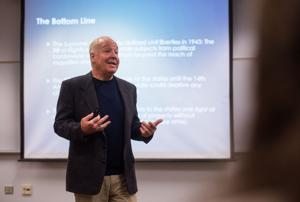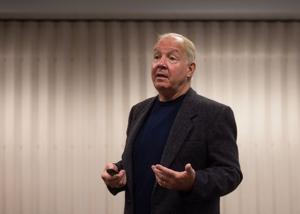http://www.newsadvance.com/lifestyles/gulf-war-illness-investigator-now-teaches-at-central-virginia-community/article_7a695607-84b6-5b03-8fba-c09d2c20add9.html
ARCHIVED ARTICLE:
Gulf War Illness investigator now teaches at Central Virginia Community College
Posted: Tuesday, November 24, 2015 12:15 am
Soldiers were getting sick and no one knew why.
So in 1993, senate staffer Jim Tuite, now a political science professor at Central Virginia Community College, began work on an investigation into symptoms of Gulf War veterans — an investigation later chronicled in the dramatized Showtime movie “A Grateful Nation.” Tuite is played by Ted Danson.
In the movie, the Tuite character takes a pointed phone call from a lieutenant colonel, telling him and Senator Donald Riegle not to put out a report detailing their findings.
“Let me explain to you the differences between how the executive and legislative branches work,” the Tuite character said. “We have every right in the world.”
Today, Tuite lectures about the powers held by various parts of government to community college students.
There’s no need to scribble in a notebook or type into a smart phone, because he provides notes. He wants students watching his face as he talks.
On a Friday morning before fall break, he paced back and forth in front of a government class, discussing federalism in the United States and topics ranging from military draft laws to police search and seizure.
He pushes his student to register to vote and to develop the skills they need to sort through the avalanche of data and opinions to make up their minds on political issues.
“I don’t care which way they end up thinking, but I at least want them to be able to weigh the facts,” he said.
Not in their heads
In 1990 and 1991, an international coalition led by the United States delivered a swift defeat to Iraqi dictator Saddam Hussein, ending his invasion of neighboring Kuwait. Gulf War Illness, or Gulf War Syndrome, as it is sometimes called, is a set of varying symptoms appearing in veterans of this war.
These include widespread pain, headaches, persistent memory problems, trouble with thinking, tiredness, respiratory and gastrointestinal issues, and skin abnormalities.
That’s according to a report presented Sept. 22, 2014 by the Research Advisory Committee on Gulf War Veterans’ Illnesses of the U.S. Department of Veterans Affairs, updating an earlier report from 2008.
The report states unequivocally Gulf War illness is a physical, not psychological, disease.
More than 25 percent of the 750,000 U.S. troops participating in the First Gulf War are affected by Gulf War Illness, according to the report. Its estimates range from 175,000 to 250,000 people.
This set of symptoms is significantly more common in Gulf War veterans than in other soldiers of the time or the general population.
There’s no known cure for Gulf War Illness and, on average, it doesn’t look like health is improving among those who suffer from it.
Soldier, scientist, sleuth
Looking back, Sen. Riegle said, it was clear just how suited Tuite was for the investigation at hand when he first began looking at Gulf War illness and possible troop exposures during the war.
“He had these special capabilities that were almost a perfect match for this sort of inquiry,” Riegle said.
Tuite began his career at the age 18, as an Army medic in the Vietnam War, evacuating wounded troops. He left the army after two years and started college, hoping to become a chemist, before changing course and taking a job as a D.C. police officer.
From there, he earned his bachelor’s degree in Administration of Justice, and took a job with the Secret Service.
The work gave him a behind-the-scenes glimpse into the humanity of presidents, ex-presidents, candidates and top officials.
“You see what they are really like,” he said. “You see them when they are tired, when they’ve given the same speech six times in one day.”
Tuite’s time there included investigations, protective intelligence, foreign intelligence, counter-terrorism, forensic science research coordination and chemical hygiene.
Tuite was working on a doctoral degree in world politics when he heard about an opening for a fellow at the U.S. Senate. In that role, he became interested in an ongoing Senate investigation into mysterious symptoms exhibited by Gulf War veterans and he took on a job serving Sen. Riegle, then head of the Senate’s banking committee.
“They wanted me to look at this one veterans issue and I was like, ‘it doesn’t look good, it looks like there were chemical exposures,’” he said.
Tuite pursued the investigation on several fronts: looking at soldiers’ symptoms, evidence of possible exposures to chemical weapons, and evidence of harmful exports from the U.S. to Iraq prior to the war.
He found evidence of biological weapons components exported from the U.S. to Iraq in prior years, evidence that fit with other reports of potentially dangerous materials and technologies allowed to enter Iraq prior to the chilling of relations with the U.S.
Tuite relied on his background as an investigator for his approach to trying to get information from government agencies.
“I would get documents that were protected under the law that weren't releasable,” he said, explaining he’d then write to the agency about the classified information he’d found. “The letter I get back with all the information in it is releasable.”
Riegle called Tuite smart, dogged and serious.
“That’s what you need in government, people who are truth tellers, who are willing to stick with things,” he said.
Chipping Away at a Mystery
Riegle retired from the Senate in 1995. Tuite became an independent national security and government relations consultant, still heavily invested and interested in Gulf War Illness.
In the years since the Gulf War, many scientists and researchers have tried to pinpoint what toxic substances soldiers might have been exposed and which, if any, of those exposures in turn caused Gulf War Illness.
Three of the suspects share chemical characteristics. Certain pesticides used during the war, the active ingredient in pills given to some troops to counteract possible nerve gas exposure, and the chemical weapon Sarin gas all fall in the category of acetylcholinesterase inhibitors, which can have varying degrees of neurotoxic effects on humans, depending on exposure level.
The 2014 report from the RAC, reiterates findings from an earlier 2008 report, suggesting Pyridostigmine Bromide in the pills, and pesticide exposures are causes of Gulf War Illness. However, a 2010 report from the Institutes of Medicine disagreed with the RAC, saying the evidence did not support labeling those or other specific exposures as causes.
U.S. Marine Corp. Major Adrian Rankine-Galloway said in an email the Department of Defense wrote to about 101,000 people in 2000, letting them know they possibly had been exposed to low-levels of chemical warfare agents related to the demolition of unsuspected chemical weapons in a pit near Khamisiyah, Iraq, in 1991. The department does not have estimates for exposures for people who weren’t U.S. service members.
“Although little is known about the long-term effects from a brief, low-level exposure to nerve agents, the current medical evidence shows that long-term health problems are unlikely,” she wrote. “This is especially true, if the exposure was too low to cause any symptoms at the time.”
Tuite however, continues to be interested in the question of exposures to chemical weapons during the gulf war.
In 2012, he and epidemiologist Robert Haley published two linked papers arguing coalition bombing of Iraqi’s chemical weapons infrastructure early in the war created fallout that traveled long-distances and ultimately affected the health of U.S. troops.
Sharing with students
Around 2000 to 2001, Tuite and his wife moved into to a horse farm in Gretna they’d first purchased in 1994.
For years, Tuite commuted from there to various jobs, including a stint as National Security Policy Advisor to Sen. Robert Byrd, D-West Virginia. So teaching at CVCC is his closest post in a decade and a half.
He started with just one class in 2011. Now, CVCC has hired him to teach full time, starting this semester. He now teaches six sections of a two-semester class on the American political process.
CVCC Vice President Muriel Mickles remembers when Tuite first asked her for a job she came away impressed by more than just his resume.
“You are looking at the personality of the person, you are looking at the way they approach you, you are looking at their warmth, and he had all of those ingredients,” she said.
She was a little unsure he’d be willing to consider what CVCC was willing to pay, but he accepted.
“He said, ‘I want to teach. That’s what I want to do. I want to teach. I’ve got something to give and while I’ve got it to give, I want to share it,’” she recalled.
Tuite establishes a rapport with his students and going out of the way to work with students who were struggling, Mickles said.
“So needless to say, we hired him,” she said.
Truth and Government
In “A Grateful Nation” the Department of Defense comes across as villainous. Riegle said he still is embittered about DOD’s handling of the situation.
Tuite sees things differently.
“I actually don’t think anybody was trying to cover anything up,” he said. “I don’t have these negative impressions of government. I have very positive impressions of government. I think people are trying to do the right thing. I think sometimes they are going about it in the wrong way.”
He said while it can be necessary to go down a rabbit hole in pursuit of the truth, people have a tendency to leap down the first rabbit hole that suits them rather than scoping out the field.
Tuite said this concept relates to what he is trying to teach his students about looking at issues from different perspectives. There are serious questions to be asked, he said, about how a government should balance the needs and wants of various people and groups against one another.
“You want to look at that breadth before we start going into depth and I don’t think we do that,” he said. “That’s human nature.”


No comments:
Post a Comment
Your comments are welcome.
Please make it clear if you wish to receive a reply. All replies are posted as follow-on comments.
Please think before you post: **If you repeatedly post comments and then delete them, particularly after others reply to you, you will be justifiably banned**.